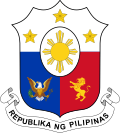| 8th Congress of the Philippines | |||||
|---|---|---|---|---|---|
| |||||
 | |||||
| Overview | |||||
| Term | July 27, 1987 – May 25, 1992 | ||||
| President | Corazon Aquino | ||||
| Vice President | Salvador Laurel | ||||
| Senate | |||||
| Members | 24 | ||||
| President |
| ||||
| President pro tempore |
| ||||
| Majority leader |
| ||||
| Minority leader |
| ||||
| House of Representatives | |||||
| Members | 214 | ||||
| Speaker | Ramon Mitra Jr. | ||||
| Speaker pro tempore | Antonio Cuenco | ||||
| Majority leader | Francisco S. Sumulong | ||||
| Minority leader |
| ||||
 |
|---|
The 8th Congress of the Philippines (Filipino : Ikawalong Kongreso ng Pilipinas), composed of the Philippine Senate and House of Representatives, met from July 27, 1987, until May 25, 1992, during the presidency of Corazon Aquino. This was the first Congress after the ratification of the 1987 Constitution of the Philippines.





